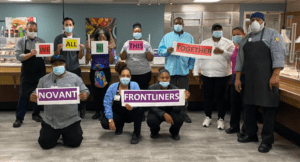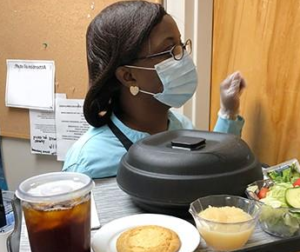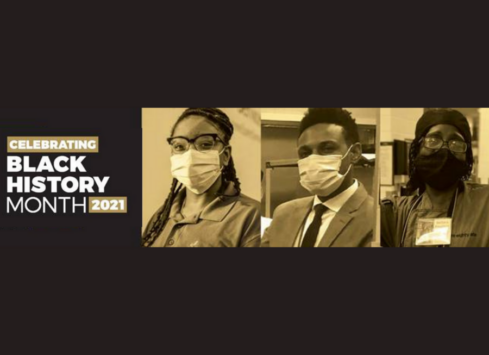What Black History Month Means to Me
By Dorothy Clarke, Regional Vice President, Morrison Healthcare
Dorothy Clarke has been with Morrison Healthcare since 2014. She is based in Charlotte and is responsible for several hospitals operated by Novant Health and the Spartanburg Regional Healthcare System. She is a licensed and registered dietitian and has more than 18 years of experience in food service.

I grew up in Kenya, but I have lived in the United States since 1983. My children are biracial and they have grown up in this country. So, my views on the meaning of Black History Month also connect with other parts of the world.
This month is important for me, and my country, because it represents the beliefs of Dr. Martin Luther King Jr. He preached about the importance of inclusion, peace, and understanding the differences we have. Most importantly, he taught me to respect and appreciate those differences.
Every day, when I meet with hospital administrators and personnel, it’s important that I represent those beliefs. I represent our company and what we stand for by being open to everyone, treating them with respect and objectively weighing their ideas. At the end of the day, I believe everyone is doing their best to make a living and take care of their families. If we treat everyone equally, it’s one way all of us can achieve that goal.

For my whole life, I’ve been inspired by Mohatma Gandhi and his teachings. Growing up in Africa, I studied Gandhi’s beliefs and traveled to India to learn more about him. A leader in the Indian campaign for home rule, Gandhi worked all his life to spread passive resistance across India and the world.
He believed in doing what was right without violence. He was peaceful. He sacrificed for others and showed compassion by going on hunger strikes so he could feel the pain of others.
So, how can I take these beliefs and use them in my daily life?
I start by always listening to people and trying to understand their point of view, even if I disagree with them. I listen to my audience – whether it’s a hospital administrator, a nurse, or an associate. They need to be heard. Gandhi taught that listening to others is the requirement of a leader.
Here’s a good example. When I’m visiting a hospital kitchen, the first place I visit is the dish room. These are the associates who are often forgotten. Few people know they are there and few people see them.
But they are an integral part of the kitchen. They do tough work, cleaning the dirty dishes and making certain the kitchen has clean service ware. From there, I speak to everyone else in the kitchen. I make it a point to speak to everyone and ask questions. They need to be heard.
 Like millions of others, I’m looking forward to celebrating the accomplishments of Black leaders and the meaning of Black History Month. Morrison and the Diversity and Inclusion Council have developed a strong plan to educate and engage associates in various activities this month.
Like millions of others, I’m looking forward to celebrating the accomplishments of Black leaders and the meaning of Black History Month. Morrison and the Diversity and Inclusion Council have developed a strong plan to educate and engage associates in various activities this month.
But because of COVID-19, I feel I can best use my time this month to help people of color understand the importance of getting the vaccine. We know it is having a greater impact on people of color than others. Black men in their 60s are still dying at a higher rate than white men in the same age group. Across men and women of all ages, Black patients are 37% more likely to die than whites.
I have 22 hospital accounts and minorities make up the majority of the patients. Unfortunately, many are uncertain if they should get the vaccine. To do my part, I have become an ambassador for the vaccine.
I was vaccinated at Novant Health Rowan Medical Center in Salisbury, N.C., and I was videotaped so others could see it. Novant administrators would like me to speak to people in their hospitals about the importance of taking it. If they see a person of color taking the vaccine, it could make a big difference.
At the hospital, I wear two masks. When I go into the kitchen, I wear a mask and a hairnet every single time. Sometimes, depending on the kitchen, I will wear up to three masks for extra protection. It’s a simple cost vs. benefits scenario. The benefits of wearing a mask mean you probably won’t get sick or even die. That’s a pretty big benefit.
Our company is all about helping patients. We see the benefits of the Power of Food every day. By helping people of color understand the importance of getting vaccinated, it’s one more way we can take our beliefs and turn them into action. If our actions can help save lives, we will make the greatest difference possible.
